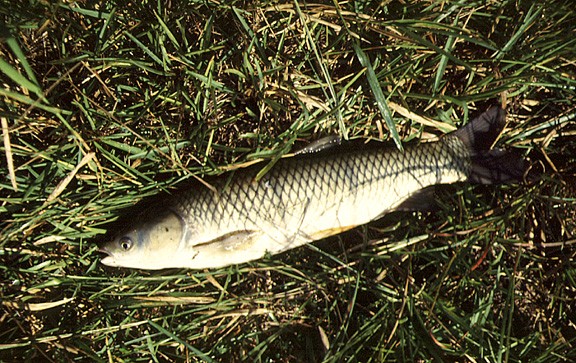Natural Solution to Fighting Pollution?
Todays News
SRQ DAILY FRESHLY SQUEEZED CONTENT EVERY MORNING
THURSDAY FEB 14, 2019 |
BY JACOB OGLES
Photo courtesy UF IFAS: Grass carp help stop the spread of invasive hydrilla.
Could more fish and native plants curb water pollution in Florida? A new bill filed by state Rep. Margaret Good, D-Sarasota, would require industry at least give the plan a try.
The freshman lawmaker this week put out new legislation to require Multimodal Biological Controls be attempted before polluters resort to spraying chemicals.
“This summer, several constituents brought to our attention that the vast majority of retention ponds use herbicides to manage invasive species growth,” Good says.
That seemed especially troublesome considering how such spraying in Lake Okeechobee has led to cyanobacteria thriving in the water there, which has then fed destructive blue-green algae blooms following releases into the Caloosahatchee and St. Lucie rivers. Many environmentalists see a correlation between those problems and the record red tide that happened on Florida’s west coast this year, as nutrient pollution seeped eventually into the Gulf of Mexico.
Good says her team looked for some meaningful way to curb such pollution. “We thought there has to be a better alternative,” she says.
Staff looked at examples of MBC in use in the region. For example, developments like The Landings utilize fish and plant growth in its stormwater management plans. That means complementary native species help control plants, algae and invasive exotics within the aquatic environment, and herbicides don’t have to be introduced.
It’s a technique promoted by the University of Florida Institute of Food and Agricultural Sciences, which successfully fought invasive aquatic plants through the release of alligator weed flea beetles and other bugs.
Good recognizes the solution won’t work for everybody, and she doesn’t want invasive species destroying habitats either. Her bill doesn’t prohibit water pollution permits from being issued by the state, but applicants must first demonstrate MBC won’t serve as the solution to a particular problem.
The bill could have a shot at passage, considering the focus on water quality issues leading into the March legislative session. Gov. Ron DeSantis is his first days in office promised $2.5 billion will be spent on water projects in his first term, and Good wouldn’t be upset if some of that money helped implement her proposal.
“In Sarasota County, there’s also some county grant money you can get,” she says.
She hopes the organic, natural solution can help prevent future disasters like the algae issues that struck the region last year.
Photo courtesy UF IFAS: Grass carp help stop the spread of invasive hydrilla.
« View The Thursday Feb 14, 2019 SRQ Daily Edition
« Back To SRQ Daily Archive









